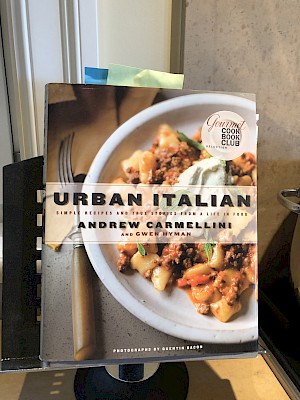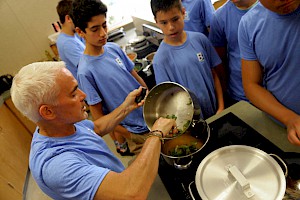Indulging in pasta in Italy uncovers how politics affect our waistlines
September 26, 2024Originally published in The Toronto Star on September 18, 2024 as contributing columnist
As an Italian, my love for Italian food runs deep.
I even make my own olive oil in Orvieto, Italy, and every time I travel there, the first thing I do is enjoy a plate of local pasta. I find myself eating more pasta in Italy than I do in Canada — it just tastes better!
Despite these indulgences, I never seem to return home with extra pounds around my waistline. Many of my friends have had similar experiences, prompting me to research why.
It’s true that Europeans generally eat smaller portions and lead more active lifestyles than North Americans. But European diets also include more fresh and whole foods, and most importantly, fewer processed food items. And guess what? Europeans are much healthier than we are. In Canada, 30 per cent of adults are considered obese, and in the U.S., that number climbs to a staggering 43 per cent. In Italy, it’s only 10 per cent.
America spends twice as much on health care as the average OECD country (Organization for Economic Cooperation and Development), yet, according to a study by the Commonwealth Fund, it is last among 11 high-income countries in providing equitably accessible, affordable, high-quality health care.
The cost of treating symptoms of chronic diseases that are entirely preventable is astronomical. The main culprit? Ultra-processed food. It’s essentially poison, often designed to increase hunger, filled with ingredients known to harm our health.
There are nearly 2,000 ingredients that are banned in Europe but still allowed in the U.S. While Canada is marginally better, banning certain flavour agents, harmful food dyes are still widely used. And some Canadian food companies continue to use controversial ingredients in their products. For example, Maple Leaf Foods has been criticized for using nitrites in their deli meats, even in products marketed as “no added preservatives.” Similarly, George Weston Ltd. faced issues with lupin-based ingredients, which can cause severe allergic reactions in people with peanut allergies.
The list of harmful ingredients is long, but here are a few examples: Sodium nitrate, used in processed meats, is associated with heart disease. Carrageenan, found in sour cream, is linked to internal ulcers and growths. Sodium benzoate, commonly in relish and diet sodas, can cause hyperactivity in children. Tartrazine, used in breakfast cereals and pastries, is associated with migraines, asthma and eczema. Azodicarbonamide, which appears in bread products, is known to cause respiratory, carcinogenic and allergic reactions. Artificial dyes and flavours contribute to a host of health issues, including gastrointestinal issues, mental health disorders, cancer, inflammation and food addiction. And then there are sugars, refined starches and seed oils found in almost all processed foods, all of which contribute to obesity, diabetes and cardiovascular diseases. Alarmingly, studies now associate Type 3 diabetes (often related to obesity) with dementia and Alzheimer’s.
So why is this allowed? And why do consumers continue to eat this junk? A major reason is the food industry’s lobbying power, which spent $28 million last year to keep the same ingredients banned in Europe legal in the U.S. The influence of processed food giants has a direct impact on public health policy, allowing known harmful ingredients to remain in circulation.
Other causes of this health epidemic include a lack of food education, the loss of the art of cooking, misleading advertising and seductive labelling with words like “natural.” Food deserts, where fresh food is difficult to access, affect 17 per cent of Americans. Even when fresh food is available, the long distances it must travel often deplete its nutritional value, necessitating the use of preservatives. Some foods are so laden with chemicals that even mould refuses to grow on them, no matter how long you leave them on the counter.
Adding insult to injury, the pharmaceutical industry preys on the health problems caused by processed food. Americans spend an astronomical amount on medications, accounting for about 45 per cent of the global pharmaceutical market. The pharmaceutical industry spends significantly more than the food industry on lobbying efforts to ensure consumers remain dependent on medications. Last year, it spent a staggering $383 million (U.S.) on lobbying. It’s as though the food and pharma industries operate symbiotically — one creates the problem, and the other profits from the solution, while consumers suffer.
Despite this bleak picture, there are ways to protect yourself. Several social media accounts aim to educate consumers about harmful ingredients — I personally follow @TheFoodBabe on Instagram. Convenience aside (we truly need to get back to home cooking), cost is the most often-used excuse for not eating healthier. But that’s a myth.
My friend, food advocate Laura Neubert, conducted a survey at a local grocery store. She found healthy meal items, such as a rotisserie chicken, vegetable soup and wraps, that cost about $4.19 per person, which is $2 cheaper than a very unhealthy Big Mac, which costs $6.19.
You can also stock your pantry with affordable staples like grains, rice, legumes, canned tomatoes, canned fish, broths, dried fruits and vegetables. Other healthy and affordable foods include peanut butter, eggs, cottage cheese and Greek yogurt. Frozen vegetables, often more nutritious than fresh produce due to the long travel distance, are another option. As a general rule, don’t eat ingredients that you can’t pronounce. And read the labels.
The solutions to this epidemic are simple, but politically obstructed. When I asked ChatGPT why the U.S. doesn’t have stricter regulations against the powerful lobby groups, it evaded the question, as too political. Ultimately, we need to pressure politicians to ignore food company lobbyists and adopt a more precautionary approach, similar to that of Europe, when approving food ingredients.
Robert Kennedy Jr. was the only major politician seriously tackling this issue before he dropped his presidential bid to align with Donald Trump. It’s rumoured that he would be appointed as some kind of health and food czar if Trump wins.
While I have my doubts about the sincerity of this commitment, at least they are going through the motions. The Democrats, and Canada, should follow suit.










